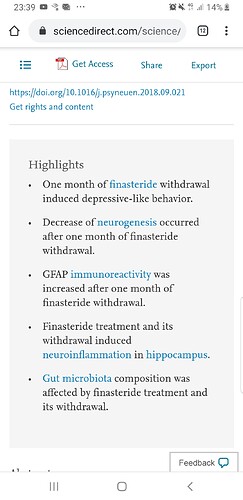Highlights
• Inhibition of 5α reductase with finasteride impaired object recognition memory in 6 month- old male 3xTgAD (Alzheimer) mice.
• 5α reductase inhibition resulted in a two-fold increase in site-specific Tau phosphorylation in the hippocampus.
• CA3 apical dendritic branching and spine density also decreased in finasteride-treated 3xTgAD males.
Abstract
Recent work has suggested that 5α-reduced metabolites of testosterone may contribute to the neuroprotection conferred by their parent androgen, as well as to sex differences in the incidence and progression of Alzheimer’s disease (AD). This study investigated the effects of inhibiting 5α-reductase on object recognition memory (ORM), hippocampal dendritic morphology and proteins involved in AD pathology, in male 3xTg-AD mice. Male 6-month old wild-type or 3xTg-AD mice received daily injections of finasteride (50 mg/kg i.p.) or vehicle (18% β-cyclodextrin, 1% v/b.w.) for 20 days. Female wild-type and 3xTg-AD mice received only the vehicle. Finasteride treatment differentially impaired ORM in males after short-term (3xTg-AD only) or long-term (3xTg-AD and wild-type) retention delays. Dendritic spine density and dendritic branching of pyramidal neurons in the CA3 hippocampal subfield were significantly lower in 3xTg-AD females than in males. Finasteride reduced CA3 dendritic branching and spine density in 3xTg-AD males, to within the range observed in vehicle-treated females. In the CA1 hippocampal subfield, dendritic branching and spine density were reduced in both male and female 3xTg-AD mice, compared to wild type controls. Hippocampal amyloid β levels were substantially higher in 3xTg–AD females compared to both vehicle and finasteride-treated 3xTg–AD males. Site-specific Tau phosphorylation was higher in 3xTg-AD mice compared to sex-matched wild-type controls, increasing slightly after finasteride treatment. These results suggest that 5α-reduced neurosteroids may play a role in testosterone-mediated neuroprotection and may contribute to sex differences in the development and severity of AD.


